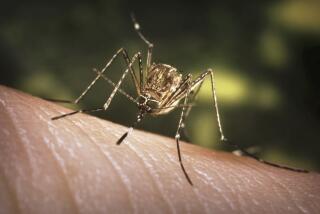First the health scare, then the facts
- Share via
Alarmed by a recent meningitis case and three of encephalitis among elementary school students, Rhode Island public officials closed schools in three communities this month while they investigated whether the cases were linked. They weren’t. But along with the recent meningitis death of a New Hampshire university student, the incidents have raised awareness of the illnesses -- and their similarities.
---
What are encephalitis and meningitis?
Encephalitis is an inflammation of the brain tissue. It’s most often caused by viruses but can also be caused by bacteria or fungi. Symptoms can include headaches, confusion and sleepiness; neurological damage and death can occur.
Meningitis is an inflammation of the protective membrane surrounding the brain and spinal cord. The resulting pressure in the skull causes headaches and sore, stiff necks. Most cases are also caused by viruses and aren’t very severe, but several types of bacteria can also cause the illness. The most dangerous -- cases of meningococcal meningitis -- are caused by the bacterium Neisseria meningitidis. The same strain of bacteria can cause illnesses, including bronchitis and , rarely, meningitis or encephalitis.
Were the outbreaks in Rhode Island and New Hampshire caused by the same bacterium?
No. The organism now suspected in the three Rhode Island cases of encephalitis -- one fatal -- is Mycoplasma pneumoniae, a bacterium that normally infects the lungs, where it isn’t usually life-threatening. The Rhode Island meningitis case joins a smattering of bacterial meningitis cases popping up around the country. The New Hampshire college student, for example, died after contracting meningococcal meningitis.
Where does the meningococcal bacteria come from?
Between 5% and 15% of people carry meningococcus in their noses and throats, though that percentage is slightly higher in adolescents, says Dr. Lee Harrison, professor of medicine at the University of Pittsburgh.
How serious is bacterial meningitis?
Although initial symptoms are ordinary enough -- flu-like aches, chills and fever -- the meningococcal infection can kill within half a day of onset of symptoms. Inflammation is the real problem, Harrison says. Antibiotics kill off the bacteria, “but it takes awhile for the body to calm down,” says Dr. William Schaffner, chairman of the preventive medicine department at Vanderbilt University School of Medicine in Nashville. Even with antibiotics, 10% to 14% of infected people die.
Can meningococcal meningitis be prevented?
A relatively new vaccine against bacterial meningitis protects against four of the five deadliest strains of meningococcus more than 95% of the time a person is exposed.
-- Mary Beckman
More to Read
Sign up for Essential California
The most important California stories and recommendations in your inbox every morning.
You may occasionally receive promotional content from the Los Angeles Times.













